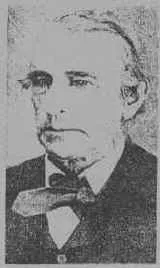Had he not been so devoted to the sciences, the name of Dr. David Alter of Freeport would loom large today in the history of the nation and the world. But he died in poverty because he had no time to exploit and commercialize the products of his marvelous inventive ability. It is doubtful if the kindly physician ever earned a dollar from his remarkable exploits, including the telegraph and telephone development. His mind was completely occupied and all his time given to his search into the mysteries of nature. And what mysteries he discovered.
Before Dr. Samuel Morse announced his discovery, Dr. David Alter developed the electric telegraph. In 1836, he joined his home and workshop with a telegraphic device. He applied for a patent four years before being granted to Dr. Morse. But it was refused. The idea is absurd and chimerical", the patent office dismissed the application.
In 1837, Dr. Alter made a small electric motor. A little later, he announced the development of a telegraph that could speak—in other words, the telephone. And long before the era of Alexander Graham Bell, Dr. Alter installed the device on his grounds in Freeport.
The Freeport physician constructed what he called an electric buggy in about 1840 —actually, it was the forerunner of the automobile.He invented a rotary motor for extracting oil from coal. One was in operation when Col. Drake drilled his well at Titusville. However, the discovery of oil made the retort of no further value.
Dr. Alter experimented with daguerreotypes and invented a process to extract bromides from the waste of salt wells along the Allegheny River. Previously, bromides had been scarce and very costly.
He was Freeport’s first photographer, taking pictures only for his own amusement. I. H. Douglas, Charles Tuxford, J. D. Stewart, and Kay Kelly were also early local photographers.In 1853, he developed the technique of spectrum analysis. If not the first, he was the second man to grasp the new science that enabled man to investigate chemical substances independent of distance utilizing luminous radiation, thereby chemically analyzing the composition of the sun and other heavenly bodies. Using spectrum analysis, man first learned that the sun contains a large amount of helium, a chemical element that no one knew existed at the time. Nearly every metal producer has also used spectrum analysis to verify alloy composition and organic chemists to identify thousands of organic compounds.
Dr. Alter was of German extraction. Jacob John Alter, a colonel in the Revolutionary War, had sailed from Rotterdam to America in the ship "Beulah" and was qualified as a citizen in Philadelphia on September 10, 1753. A direct descendant of this ancestral line, Sampson Ritner Alter moved to Harrison Township soon after 1840 with his wife Hannah Beale, and there they farmed and raised a family upon the upper reaches of the Little Bull Creek, near the Butler County line.
Another direct descendant of his line was John Alter. His son David became the famous scientist of Freeport, and David’s son-in-law, Albert Burtner, was one of the early photographers in Freeport and Natrona.Another son of John Alter (Jacob) became a cooper (barrel maker) and ran a general store in Freeport. His son, William Sampson Alter, born in Freeport two years before his father’s death in 1849, was a driver on the canal when he was very young. As soon as he was old enough, he became a canal boat captain. His summers were spent transporting oil from Oil City to Pittsburgh. In winter, he worked in a sawmill. This work was given up when he became cleaner and inspector of the railroad oil tanks, but, failing in health, he was advised to learn the tinners' trade and the hardware business. In 1883, he moved his family to Tarentum to begin the firm of Alter and Goldinger.
Dr. David Alter was born in 1807 in Allegheny Township, across the Allegheny River from Freeport. The family had settled in the area in about 1800. German was the household language, but young David mastered English by reading the New Testament. When he was 19, he refused to speak German to anyone except people unable to speak English.
He delighted in reading and borrowed books from almost everyone who would lend them. A story is told of how the young man’s father exploded one day when he found himself seated on a stump reading while he was supposed to be plowing a field. One of the borrowed books introduced him to the mysteries of electricity and chemistry and aroused his life’s chief interest. He studied medicine and started to practice about 1831. A few years later, he came to Freeport.He traveled by horseback and visited patients at great distances, sometimes as far as 15 and 20 miles. The records of his day described him as "a good doctor." Francis R. Harbison, in his book, "Flood Tides Along the Allegheny" says: "Men may deplore his failure to obtain any reward for his labors. Their minds are attuned to recompense in wealth and luxuries. Dr. Alter was a pioneer in the sciences and, to one of his spirits, worldly possessions are more frequently a burden than a blessing. He lived among agricultural people. They had little need for his discoveries. Needs, actual or imaginary, create demands. Until demand arises, the fruits of genius are rarely marketable. His was the normal fate of the forerunner. White men may bestow their admiration upon him, they can well withhold their pity, for he was doubtless content in his achievements".
Dr. David Alter died in 1881.
Note: Anna Alter (daughter of Dr. David Alter) married George A. Burtner, a professional photographer from Freeport. Their grandson, Edward Clyde Scott, of Rome, New York, recently donated a collection of 530 glass photographic negatives to the Historical Society. George Burtner prepared these glass plates between 1905 and 1915.